![The Apu Trilogy (Criterion Collection) UK Only [Blu-ray] [2020]](/pictures/1151358.jpg) The Apu Trilogy (Criterion Collection) UK Only | Blu Ray | (25/05/2020)
from £61.98
| Saving you £N/A (N/A%)
| RRP
The Apu Trilogy (Criterion Collection) UK Only | Blu Ray | (25/05/2020)
from £61.98
| Saving you £N/A (N/A%)
| RRP Two decades after its original negatives were burned in a fire, Satyajit Ray's breathtaking milestone of world cinema rises from the ashes in a meticulously reconstructed new restoration. The Apu Trilogy brought India into the golden age of international art-house film, following one indelible character, a free-spirited child in rural Bengal who matures into an adolescent urban student and finally a sensitive man of the world. These delicate masterworks- Pather Panchali (Song of the Little Road), Aparajito (The Unvanquished), and Apur Sansar (The World of Apu)-based on two books by Bibhutibhusan Banerjee, were shot over the course of five years, and each stands on its own as a tender, visually radiant journey. They are among the most achingly beautiful, richly humane movies ever made-essential works for any film lover. Pather Panchali The release in 1955 of Satyajit Ray's debut, Pather Panchali, introduced to the world an eloquent and important new cinematic voice. A depiction of rural Bengali life in a style inspired by Italian neorealism, this naturalistic but poetic evocation of a number of years in the life of a family introduces us to both little Apu and, just as essentially, the women who will help shape him: his independent older sister, Durga; his harried mother, Sarbajaya, who, with her husband away, must hold the family together; and his kindly and mischievous elderly auntie, Indir-vivid, multifaceted characters all. With resplendent photography informed by its young protagonist's perpetual sense of discovery, the Cannes-awarded Pather Panchali is an immersive cinematic experience and a film of elemental power. Aparajito Satyajit Ray had not planned to make a sequel to Pather Panchali, but after the film's international success, he decided to continue Apu's narrative. Aparajito picks up where the first film leaves off, with Apu and his family having moved away from the country to live in the bustling holy city of Varanasi (then known as Benares). As Apu progresses from wide-eyed child to intellectually curious teenager, eventually studying in Kolkata, we witness his academic and moral education, as well as the growing complexity of his relationship with his mother. This tenderly expressive, often heart-wrenching film, which won three top prizes at the Venice Film Festival, including the Golden Lion, not only extends but also spiritually deepens the tale of Apu. Apur Sansar By the time Apur Sansar was released, Satyajit Ray had directed not only the first two Apu films but also the masterpiece The Music Room, and was well on his way to becoming a legend. This extraordinary final chapter brings our protagonist's journey full circle. Apu is now in his early twenties, out of college, and hoping to live as a writer. Alongside his professional ambitions, the film charts his romantic awakening, which occurs as the result of a most unlikely turn of events, and his eventual, fraught fatherhood. Featuring soon to be Ray regulars Soumitra Chatterjee and Sharmila Tagore in star-making performances, and demonstrating Ray's ever more impressive skills as a crafter of pure cinematic imagery, Apur Sansar is a moving conclusion to this monumental trilogy. Special Features: New 4K digital restorations of all three films, undertaken in collaboration with the Academy Film Archive at the Academy of Motion Picture Arts and Sciences and L'Immagine Ritrovata, with uncompressed monaural soundtracks on the Blu-rays Audio recordings from 1958 of director Satyajit Ray reading his essay A Long Time on the Little Road and in conversation with film historian Gideon Bachmann New interviews with actors Soumitra Chatterjee, Shampa Srivastava, and Sharmila Tagore; camera assistant Soumendu Roy; and film writer Ujjal Chakraborty New video essay by Ray biographer Andrew Robinson on the trilogy's evolution and production The Apu Trilogy : A Closer Look, a new program featuring filmmaker, producer, and teacher Mamoun Hassan Excerpts from the 2003 documentary The Song of the Little Road, featuring composer Ravi Shankar The Creative Person: Satyajit Ray, a 1967 half-hour documentary by James Beveridge, featuring interviews with Ray, several of his actors, members of his creative team, and film critic Chidananda Das Gupta Footage of Ray receiving an honorary Oscar in 1992 New program on the restorations by filmmaker :: kogonada New English subtitle translations PLUS: A booklet featuring essays by critics Terrence Rafferty and Girish Shambu
![Charulata (1964) (Criterion Collection) UK Only [Blu-ray] [2021]](/pictures/1154690.jpg) Charulata (1964) (Criterion Collection) UK Only | Blu Ray | (05/04/2021)
from £22.98
| Saving you £N/A (N/A%)
| RRP
Charulata (1964) (Criterion Collection) UK Only | Blu Ray | (05/04/2021)
from £22.98
| Saving you £N/A (N/A%)
| RRP This film about a woman's artistic and romantic yearning by SATYAJIT RAY (The Music Room) is set in late nineteenth-century, pre-independence India. It takes place in the gracious home of a liberal-minded, workaholic newspaper editor and his lonely, stifled wife, Charulata (The Big City's MADHABI MUKHERJEE), whose exquisitely composed features mask a burning creativity. When her husband's poet cousin comes to stay with them, Charulata finds herself both inspired by him to pursue her own writing and dangerously drawn to him physically. Based on a novella by the great Rabindranath Tagore, Charulata is a work of subtle textures, a delicate tale of a marriage in jeopardy and a woman taking the first steps toward establishing her own voice. Special Features: New 2K digital film restoration, with uncompressed monaural soundtrack New interview program with actors Madhabi Mukherjee and Soumitra Chatterjee Adapting Tagore, a new interview program featuring Indian film scholar Moinak Biswas and Bengali literature historian Supriya Chaudhuri Archival audio interview with director Satyajit Ray by film historian Gideon Bachmann New English subtitle translation PLUS: A booklet featuring an essay by critic Philip Kemp and a 1980s interview with Ray by his biographer Andrew Robinson
![Devi (1960) (AKA The Goddess) (Criterion Collection) UK Only [Blu-ray] [2021]](/pictures/1156515.jpg) Devi (1960) (AKA The Goddess) (Criterion Collection) UK Only | Blu Ray | (22/11/2021)
from £22.98
| Saving you £N/A (N/A%)
| RRP
Devi (1960) (AKA The Goddess) (Criterion Collection) UK Only | Blu Ray | (22/11/2021)
from £22.98
| Saving you £N/A (N/A%)
| RRP Master filmmaker Satyajit Ray (The Apu Trilogy) explores the conflict between fanaticism and free will in Devi (The Goddess), issuing a subversively modern challenge to religious orthodoxy and patriarchal power structures. In the waning days of mid-nineteenth-century India's feudal system, after his son (Apur Sansar's Soumitra Chatterjee) leaves for Kolkata to complete his studies, a wealthy rural landowner (The Music Room's Chhabi Biswas) is seized by the notion that his beloved daughter-in-law (The Hero's hauntingly sad-eyed Sharmila Tagore) is the reincarnation of the goddess Kalia delusion that proves devastating to the young woman and those around her. The opulently stylized compositions and the chiaroscuro lighting by cinematographer Subrata Mitra (Charulata) heighten the entrancing expressionistic intensity of this domestic tragedy, making for an experience that is both sublime and shattering. Bonus Features 4K digital restoration, with uncompressed monaural soundtrack Interviews with actors Sharmila Tagore and Soumitra Chatterjee, recorded in 2013 Video essay by film scholar Meheli Sen English subtitle translation PLUS: An essay by film critic Devika Girish
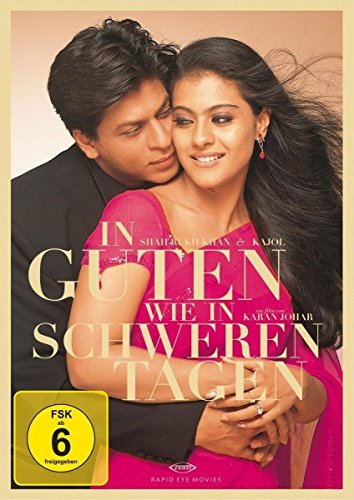 In guten wie in schweren Tagen (4 Disc Jubiläumsedition DVD & Blu-ray) | Blu Ray | (15/07/2016)
from £N/A
| Saving you £N/A (N/A%)
| RRP
In guten wie in schweren Tagen (4 Disc Jubiläumsedition DVD & Blu-ray) | Blu Ray | (15/07/2016)
from £N/A
| Saving you £N/A (N/A%)
| RRP  Abhijan | DVD | (29/05/2006)
from £20.24
| Saving you £-0.25 (N/A%)
| RRP
Abhijan | DVD | (29/05/2006)
from £20.24
| Saving you £-0.25 (N/A%)
| RRP Abhijan was Satyajit Ray's most popular film in Bengal: a ""conscious"" effort to communicate with a wider audience. The project was originally conceived by his friends and Ray stepped in when they panicked at the prospect of directing. Ray's mastery turned a starkly conventional plot into a subtly nuanced story which topped the Bengali box office for months. Set on the Bihar-Bengal border where Marwari businessmen - a powerful Hindi-dialect community of entrepreneurs much disl
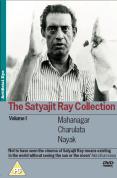 Satyajit Ray Collection Vol.1 | DVD | (25/08/2008)
from £N/A
| Saving you £N/A (N/A%)
| RRP
Satyajit Ray Collection Vol.1 | DVD | (25/08/2008)
from £N/A
| Saving you £N/A (N/A%)
| RRP Satyajit Ray is internationally acknowledged as one of the great masters of world cinema. His films - many of them masterpieces - have won him legions of admirers among them Akira Kurosawa Henri Cartier-Bresson V.S. Naipaul and Martin Scorsese. This box set features the following films: Mahanagar (Aka: The Big City) (1963): Set in the mid '50s Ray's often humorous story of conflicting social values in India's lower-middle class stars Madhabi Mukherjee as a housewife whose growing independence alarms her traditionalist India 1963 family. Charulata (Aka: The Lonely Wife) (1964): Neglected by her ambitious journalist husband the lonely Charulata (Madhabi Mukherjee) befriends his cousin (Soumitra Chatterjee) a sensitive aspiring writer and almost inevitably their feelings for each other begin to deepen. Adapted from a story by Rabindranath Tagore Ray considered this sesnitively realised drama one of his finest achievements. Nayak (Aka: The Hero) (1966): This beautifully observed character study was one of Ray's earliest original screenplays. En route to an award ceremony a famous and egocentric Bengali movie star finds that he is compelled to re-evaluate his life after encountering a disapproving young journalist (Sharmila Tagore).
 The Rising - Ballad Of Mangal Pandey | DVD | (05/12/2005)
from £20.00
| Saving you £-11.01 (N/A%)
| RRP
The Rising - Ballad Of Mangal Pandey | DVD | (05/12/2005)
from £20.00
| Saving you £-11.01 (N/A%)
| RRP Marking the return of Aamir Khan after 4 years (previously starring in the Oscar-nominated Lagaan) 'The Rising' is a majestic tale of friendship love loss & betrayal. Set against the backdrop of the Indian mutiny of 1857 'The Rising' tells the story of British Army soldier Mangal Pandey (Aamir Khan) and his friendship with his commanding officer William Gordon (Toby Stephens) who finds that running the affairs of the East India Company conflicts with the compassionate administrati
![Black [2005]](/pictures/1043437.jpg) Black | DVD | (02/04/2005)
from £6.66
| Saving you £2.33 (34.98%)
| RRP
Black | DVD | (02/04/2005)
from £6.66
| Saving you £2.33 (34.98%)
| RRP Transcending the barrier of language this is a film that explores human relationships gratitude love and sacrifice... Debraj Sahani is a teacher to Michelle McNally who is both deaf mute and blind he meets her as an eight year old who doesn't understand anything. She is violent confused and unable to comprehend her life. Her world is 'Black'. Debraj leads her from this darkness and confusion into light and hope how he makes her discover her an identity this makes her feel human rather than someone inferior with a disability. He is her teacher her guru the one who leads her from the darkness into the light....
 Chalte Chalte | DVD | (28/07/2003)
from £10.99
| Saving you £20.00 (181.98%)
| RRP
Chalte Chalte | DVD | (28/07/2003)
from £10.99
| Saving you £20.00 (181.98%)
| RRP Opposites attract right? That's what happens when Raj (Shahrukh Khan) and Priya (Rani Mukherji) bump into each other on a highway. They are as diverse as chalk and cheese. Raj is an impulsive middle class hard-working emotional guy while Priya is prim and proper highly sophisticated and brought up in the lap of luxury. They throw caution to the winds and dare to fall in love. But gradually things start changing. Romance takes a backseat the need to impress no longer exists. What happens next?
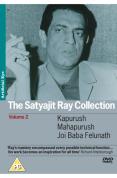 The Satyjit Ray Collection Vol.2 | DVD | (22/09/2008)
from £N/A
| Saving you £N/A (N/A%)
| RRP
The Satyjit Ray Collection Vol.2 | DVD | (22/09/2008)
from £N/A
| Saving you £N/A (N/A%)
| RRP Satyajit Ray's artistic legacy is one of the most formidable in all of film history. Exceptionally versatile his films covered almost every conceivable genre winning him nearly every major cinema award including an Oscar for lifetime achievement. Titles Comprise: Kapurush (a.k.a The Coward) (1965): Stranded in a small town screenwriter Amitabha Roy is astonished to encounter a former lover who is now married to the owner of a tea plantation. Recalling his inability to commit to her and the relationship's resultant breakdown Roy decides to make amends for the past. Mahapurush (a.k.a The Holy Man) (1965): Ray's rarely-seen gem is a comedy-drama in which a gullible and religiously devout retiree is completely taken in by a bogus holy man and enlists the charlatan's help in finding his daughter a husband. But she is being courted by a young man who determines to expose the fraudster. Joi Baba Felunath (1978): Set in the holy city of Benares where Ray had shot Aparajito over 20 years previously this adventure story adapted from Ray's own novel stars Soumitra Chatterjee as a detective investigating the theft of a priceless gold icon.
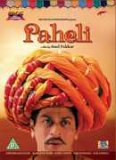 Paheli | DVD | (15/08/2005)
from £N/A
| Saving you £N/A (N/A%)
| RRP
Paheli | DVD | (15/08/2005)
from £N/A
| Saving you £N/A (N/A%)
| RRP A Peacock spreads its mesmerizing wings underneath the scorching blue sky. Vibrant puppets descend from the gnarled branches of an ancient tree. Golden sands of an endless desert keep on swirling. And a beautiful folk tale from Rajasthan comes to life in Paheli. Once upon a time there was a lovely girl who was married to a man who was only interested in making money. There was a Ghost who fell madly in love with her. On the wedding night itself the husband left the home for
![Dil To Pagal Hai [1997]](/pictures/1006472.jpg) Dil To Pagal Hai | DVD | (02/09/2002)
from £N/A
| Saving you £N/A (N/A%)
| RRP
Dil To Pagal Hai | DVD | (02/09/2002)
from £N/A
| Saving you £N/A (N/A%)
| RRP ""Dil to Pagal Hai"" (The Heart is Crazy) is a story that makes this belief come true it is a story of Rahul (Shahrukh Khan) who does not believe in love. Rahul fails to understand how two people can spend their entire lives together - is there really someone made for him? It is the story of Pooja (Madhuri Dixit) who believes that there is someone who is made for her and love is friendship and one day her dream will come true. This film is a grand musical about passionate people
![Hum Tum [2004]](/pictures/1043239.jpg) Hum Tum | DVD | (06/11/2006)
from £14.99
| Saving you £-5.00 (N/A%)
| RRP
Hum Tum | DVD | (06/11/2006)
from £14.99
| Saving you £-5.00 (N/A%)
| RRP Karan Kapoor (Saif Ali Khan) who works as a cartoonist with one of India's leading newspapers. Karan runs a cartoon strip in the paper under the name of Hum Tum. He sees the world is divided by Boy and Girl not by country not by religion. It's the only divison Karan sees in this world. Karan met Rhea (Rani Mukerjee) for the first time in Amsterdam. There they disagreed on everything. So to put things right Karan innocently kissed her to confirm their friendship. But things went worse and the meeting ended on a bad note. Six months later they again meet in New York the Amsterdam kiss is still fresh in Rhea's mind and she spills the beans to Karan's steady girlfriend. From then he meets Rhea on a regular basis at various stages in their lives. But every meeting has ended on a bad note. During this period Rhea has gone through some personal tragedies and also passed several ups and downs but Karan has always been there for her. During this time she has moved all over the place from Mumbai to Paris to New York and back to Mumbai. Karan even tried fixing her up with a friend of his - with her mothers permission of course - but as with everything else this didn't quite work out either. As luck would have it Karan's career as a cartoonist was soaring and so one thing led to another and Rhea took off once again on a bad terms. But despite their mishaps destiny has bigger plans for Karan and Rhea......
 Devdas | DVD | (20/01/2003)
from £N/A
| Saving you £N/A (N/A%)
| RRP
Devdas | DVD | (20/01/2003)
from £N/A
| Saving you £N/A (N/A%)
| RRP A story of a love beyond all else - even life. The saga of a man called Devdas who loved Paro since they were children. But after he broke her heart she married someone else and he turned to drink.
![Saawariya [2007]](/pictures/1079657.jpg) Saawariya | DVD | (19/05/2008)
from £38.72
| Saving you £-18.73 (N/A%)
| RRP
Saawariya | DVD | (19/05/2008)
from £38.72
| Saving you £-18.73 (N/A%)
| RRP A romantic rhapsody about a self styled rock star angel, loved by one and all. The story was inspired by Krishna, the Hindu god of love and is loosely based on Dostoevsky's "White Nights".
![Charulata [DVD]](/pictures/1121722.jpg) Charulata | DVD | (24/06/2013)
from £21.58
| Saving you £N/A (N/A%)
| RRP
Charulata | DVD | (24/06/2013)
from £21.58
| Saving you £N/A (N/A%)
| RRP ![Charulata [Blu-ray]](/pictures/1121696.jpg) Charulata | Blu Ray | (26/08/2013)
from £26.98
| Saving you £-6.99 (-35.00%)
| RRP
Charulata | Blu Ray | (26/08/2013)
from £26.98
| Saving you £-6.99 (-35.00%)
| RRP Neglected by her ambitious journalist husband the lonely Charulata befriends his cousin a sensitive aspiring writer and almost inevitably their feelings for each other begin to deepen. Adapted from a story by Rabindranath Tagore Ray considered this sensitively realised drama one of his finest achievements.
![Mr And Mrs Iyer [2002]](/pictures/1005595.jpg) Mr And Mrs Iyer | DVD | (13/10/2003)
from £9.43
| Saving you £10.56 (111.98%)
| RRP
Mr And Mrs Iyer | DVD | (13/10/2003)
from £9.43
| Saving you £10.56 (111.98%)
| RRP Meenakshi Iyer is travelling on a bus with her infant child when it is stopped by an angry mob looking for Muslims. Sitting with Meenkashi is a Muslim man who fears for his life and so she passes him off as her husband.
![The Cloud Capped Star [1960]](/pictures/1005997.jpg) The Cloud Capped Star | DVD | (07/10/2002)
from £25.63
| Saving you £-5.64 (N/A%)
| RRP
The Cloud Capped Star | DVD | (07/10/2002)
from £25.63
| Saving you £-5.64 (N/A%)
| RRP Considered to be a masterpiece this is an emotionally powerful melodrama about a young woman's struggle to support her refugee family in the post-Partition of Calcutta.
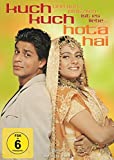 Kuch Kuch Hota Hai - Und ganz plötzlich ist es Liebe: Best of Bollywood | DVD | (09/10/2006)
from £N/A
| Saving you £N/A (N/A%)
| RRP
Kuch Kuch Hota Hai - Und ganz plötzlich ist es Liebe: Best of Bollywood | DVD | (09/10/2006)
from £N/A
| Saving you £N/A (N/A%)
| RRP 
Please wait. Loading...
This site uses cookies.
More details in our privacy policy